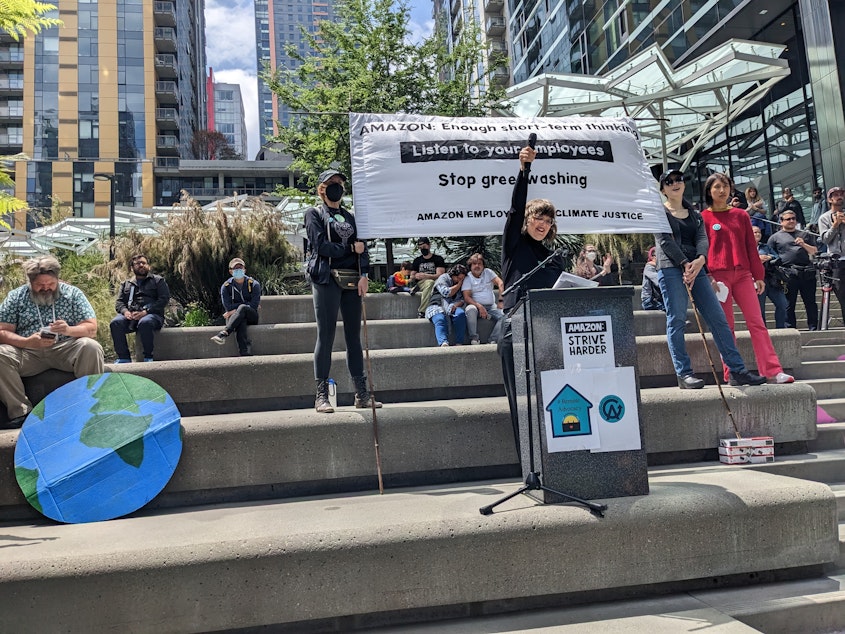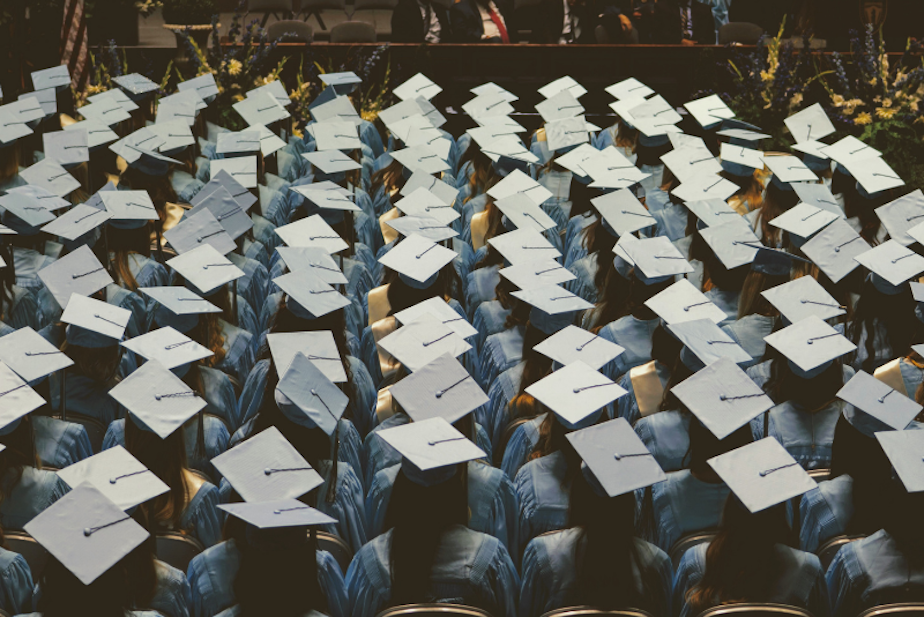Let's get weird: Today So Far
- TSF readers weigh in on the word "weird" and whether or not Seattle and the Northwest have retained their signature weirdness.
- Also, Seattle's schools have become less diverse in recent years.
This post originally appeared in KUOW's Today So Far newsletter for June 2, 2023.
Seattle's schools are getting less diverse and some of the blame is being placed on the absence of Seattle Public Schools' busing program. But there is some nuance to the history of bussing in the city.
Seattle's bussing program started in the 1980s. It moved students from different areas of the city to schools they wouldn't normally attend because of their address. The idea was to counter the city's segregated history, make its schools more diverse, and expose students to cultures, classes, and experiences they wouldn't otherwise have. Up to 15,000 students were mandatorily bussed each year. A 2007 lawsuit ultimately concluded that the bussing program was unconstitutional. Looking back, results of bussing in Seattle are considered mixed. As Seattle Times reporter Dahlia Bazzaz told KUOW's Soundside, the burden of bussing was more severe for students of color; white students in the district dropped by about 28% when the program first started. The Times also reports that it's difficult to measure any educational benefits.
Participants were also divided on the issue. As KUOW has previously reported, one student changed her race on school records from Black to white in order to stay at Garfield High School.
“I actually graduated Garfield as a white female because that was the only way I could get back in, is to change my race,” Teya Williams told KUOW in 2013.
Others, such as Anthony Ray, aka Sir Mix-A-Lot, felt differently. He lived in the Central District, but attended Eckstein Middle School and Roosevelt High School in Northeast Seattle. That is where he initially discovered his love of music. Over the years, he has commented on his education in Seattle.
Sponsored
"Being exposed to other cultures and other ways of doing things was the best thing that could have happened to me, especially eventually becoming an artist," Ray told Seattle Refined.
“I’ve heard things like, ‘Forced integration is not good,’ ‘I want my kid to be able to go to school in our community; that’s why we moved here’ – all those things I totally understand,” Ray previously told KUOW. “But from my perspective, I didn’t have the luxury of living in a neighborhood where a good school was. We didn’t make that kind of money. My mom worked as an LPN at the King County Jail making 6 or 7 bucks an hour. So from my perspective, it was the best thing that could have happened to me.”
Fast forward to today, and Seattle's schools are different. The numbers indicate that the schools are becoming less diverse. For example, northwest Seattle's West Woodland Elementary School was 50% students of color in the 1990s. Today, it's 27%. Bailey Gatzert Elementary along Yesler Way and 12th Avenue South was 65% students of color in 1990. Today, it's 88%. KUOW's Soundside dove into this reporting here.
Now, let's get weird!
Earlier this week, I asked you if Seattle was still weird? Also, is the Northwest weird? And, are we using the word "weird" too much? This was a follow-up question to Bill Radke's "Words in Review" segment on the word. In short, Radke feels "weird" is overused, not descriptive enough, and he avoids it. He even said it should be banished. His guest, author Erik Davis, felt otherwise. TSF readers wrote in with a few thoughts of their own.
Sponsored
Ward agrees with a sentiment from Radke's original segment — that "weird" is a "wastebasket word." He says that, like Radke, he avoids the word because "'weird' has indeed become a sort of intellectually lazy word used to mean just about anything that is 'peculiar' or 'unusual.'" He says he reserves "weird" when something is "inexplicable without resorting to irrational or supernatural explanations."
BJ says that "Portlandia" capitalized on the Northwest's weird vibes, and adds that, "In the '90s, Seattle weird was equated with an elan of cool. Quirky and offbeat were countercultural to the mainstream. But much of what was uniquely weird became mainstream: hipster coffee, beer, food, and rebellious fashion all became ubiquitous and corporate. There will always be evolving localized fringe cultures outside the current norm, whatever we call it."
James falls within the "be more specific" crowd when it comes to the word. "By 'weird' do you mean 'creative'? If so, say so. Even better, cut down inside 'creative' to whatever it is that you find creative. Goal is clarity. Say it totally, say it right, the first time."
For Dean, "weird" is political, commenting that "It's weird that we've allowed billionaires of California and our own to completely upend living here for many of us artists and essential workers ... It's weird our city council loves and bathes themselves in the glory of great wealth. It's weird so many deny this fact. It's weird how the city continues to create homelessness, then wrings its hands knowing full well why there is so much homelessness. They did it! ... We know exactly what the new weird is, what it consists of, and how it destroyed the good old weird ... Good weird left the station and is long gone."
Karin recalls that she wrote about being weird in the 1977 edition of Roosevelt High School's poetry publication. She says the city has stayed weird ever since, and connects the region's music scene to that weirdness. "Seattle weirdness is why I am who I am. It’s because us born-n-raised in Seattle are a little 'off' from anyone else. I mean, that whole grunge thing wouldn’t have happened if the rest of us hadn’t been here to encourage the bands in the first place. Not everyone was in a band ... And most of us went to desegregated schools, so have friends in all corners of the city, in all income brackets and circumstances. We are all a mass of usually incompatible passions. That is what makes us Seattle weird, and I, for one, will never give it up."
Sponsored
Bobbi Jo has moved around the region quite a bit and believes that Oregon "claims the weird trophy" for the Northwest. "Seattle used to be darkly odd, but not weird," and Bellingham was once "tiny weird." Sure, Seattle's Space Needle is a bit odd, and the gum wall was once weird, but now it's "bougie." But Oregon is "the mushroom of America. And mushrooms are the weirdest things we put in our mouths." Oregon has its vortex, a hell hole, and you can't pump your own gas, Bobbi Jo notes. "Should we ban the word 'weird?' Nope, I think weird is fine, but only if describing Oregon."
Agree or disagree with Radke, I'm realizing that this all might inadvertently prove his point — "weird" is a very relative word. Folks here referenced odd, being a little off, music, creativity, billionaires and the cost of living, counterculture, and mushrooms. That's quite a range, and weird works for it all, but I could also say that the cost of living is just sad, mushrooms are tasty, and that our regional music sounds like a chorus of axes and saws felling trees in the shadow of a dewy mountain.
The Friday Five: News you may have missed this week, and other cool stuff on KUOW.org
- Federal judge ‘extremely skeptical’ that SPD could soon exit consent decree
- Tara Reade, who accused Biden of sexual assault, will apply for Russian citizenship
- Seattle employer can sue workers over 2017 strike, U.S. Supreme Court rules
- Facebook, Instagram to block news stories in California if bill passes
- Community court is ending in Seattle. What does that mean for defendants?
AS SEEN ON KUOW
Sponsored

Former Amazon Employee Emily Cunningham speaks at a walkout protesting the company's carbon footprint and return-to-office policy this past week. Organizers of the walkout estimate about 900 Seattle employees participated. Amazon says its count was closer to 300. Current and former Amazon employees and climate change activists spoke during the hour-long event. (Monica Nickelsburg / KUOW)
DID YOU KNOW? The PNW is a pinball-loving region
In honor of the Northwest Pinball and Arcade Show coming to Tacoma this weekend, here is my final pinball factoid for this week. Don't worry, it's not as lengthy as yesterday's brief history of Seattle pinball.
On a recent trip to LA, something struck me as odd. "Where are all the pinball machines?!" I asked. Stepping away from the Northwest, it becomes quite clear how lucky we are that our region is a pinball-loving region. It's part of our local culture, like hiking, micro brews, and tech. It can be easy to take for granted that wherever you are in Western Washington, you're usually not too far from a pinball game.
Sponsored
In Los Angeles, there are 212 pinball machines. That might sound like a lot, but for a big city like LA, it's not much. In our smaller city of Seattle, there are 630 pinball machines. That's not counting neighboring towns, like Tacoma (127), or Kitsap County (about 80 if you don't count retired basketball star Todd MacCulloch's garage ... he has enough to host a world pinball championship tournament). Between Olympia and Bellingham, Western Washington has 1,470 machines. This is all according to the Pinball Map, the go-to source for finding pinball. Over in the Portland metro area (including Vancouver, Wash., Hillsboro, etc.), there are 921 pinball games.
So yes, our region boasts more pinball machines than LA. We also have far more than New York City (242), or Las Vegas which has 459 (341 of which are located at the Pinball Hall of Fame). Chicago — the city where most of these games are created and manufactured — only has 290.
ALSO ON OUR MINDS

Senate passes GOP-led resolution to block Biden's student loan relief plan
The Senate passed legislation on Thursday seeking to repeal the Biden administration's student loan relief plan, setting up a pledged veto from the president. The relief plan, which would cancel up $20,000 in federal student loan debt for tens of millions of Americans, has been tied up in the courts for months. A Supreme Court ruling that could block the plan is expected by early July.

